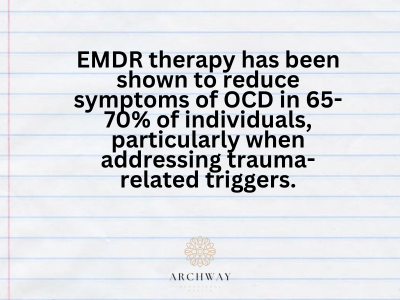Obsessive-Compulsive Disorder (OCD) is a complex mental health condition that can significantly impact an individual’s quality of life. Characterized by intrusive, unwanted thoughts (obsessions) and repetitive behaviors or rituals (compulsions), OCD often creates a cycle of anxiety and temporary relief through compulsions, making it difficult to break free from its grip. While traditional treatments like Cognitive Behavioral Therapy (CBT) and medication are widely used, Eye Movement Desensitization and Reprocessing (EMDR) Therapy has emerged as a highly effective tool for addressing the underlying trauma or negative thought patterns that fuel OCD symptoms.
At Archway Behavioral Health, we integrate EMDR Therapy into our evidence-based treatment programs to help individuals overcome the challenges of OCD. Our comprehensive approach combines Individual Therapy, Group Therapy, and structured care options like the Partial Hospitalization Program (PHP) and Intensive Outpatient Program (IOP) to provide personalized, holistic care. In this detailed guide, we’ll explore how EMDR Therapy can help individuals with OCD break free from obsessive thoughts, process past traumas, and achieve lasting relief.
Understanding OCD: A Cycle of Obsessions and Compulsions
OCD is a mental health disorder that affects how individuals think and behave. It is often characterized by:
- Obsessions: Persistent, intrusive, and unwanted thoughts, images, or urges that cause significant distress. Examples include fears of contamination, doubts about safety, or intrusive violent or sexual thoughts.
- Compulsions: Repetitive behaviors or mental rituals performed to neutralize or reduce the anxiety caused by obsessions. Examples include excessive handwashing, checking locks, or counting routines.
The Emotional Toll of OCD:
- Anxiety and Fear: Obsessions often create a sense of impending danger or catastrophe.
- Shame and Guilt: Individuals may feel embarrassed about their thoughts or behaviors.
- Isolation: OCD can interfere with relationships and daily activities, leading to social withdrawal.
For some individuals, OCD symptoms are exacerbated by underlying trauma or deeply rooted negative beliefs. This is where EMDR Therapy can be particularly beneficial.
What Is EMDR Therapy?
Eye Movement Desensitization and Reprocessing (EMDR) is an evidence-based psychotherapy that helps individuals process and resolve distressing memories or beliefs that may be contributing to current mental health symptoms. Originally developed to treat trauma and PTSD, EMDR has since been adapted for various conditions, including OCD.
How EMDR Works:
- Bilateral Stimulation: While recalling distressing memories or thoughts, clients engage in bilateral stimulation, such as guided eye movements, tapping, or auditory tones.
- Desensitization: The process reduces the emotional intensity of the memory or thought, making it less triggering.
- Reprocessing: Clients are guided to reframe their understanding of the memory or thought, replacing negative beliefs with healthier perspectives.
For individuals with OCD, EMDR can target and reprocess the thoughts, beliefs, or past experiences that contribute to obsessive-compulsive symptoms.
How EMDR Therapy Helps Treat OCD
1. Addressing Trauma and Its Connection to OCD
For some individuals, OCD symptoms are rooted in past traumatic experiences or adverse events. For example, someone who experienced illness or injury in childhood may develop contamination-related obsessions. EMDR Therapy helps process these experiences, reducing their emotional impact and influence on current behavior.
- Example: A client with contamination OCD may use EMDR to process memories of a family member’s severe illness, lessening the intensity of their fear of germs.
2. Reducing the Emotional Impact of Intrusive Thoughts
Obsessions in OCD are often accompanied by overwhelming anxiety or distress. EMDR helps desensitize the emotional response to these thoughts, making them less intense and disruptive over time.
- Example: Through EMDR, a client with intrusive thoughts about harming others can reduce their fear and guilt, allowing them to recognize these thoughts as meaningless mental noise rather than threats.
3. Reframing Negative Core Beliefs
OCD is often fueled by rigid or distorted core beliefs, such as “I must be perfect” or “If I don’t perform this ritual, something terrible will happen.” EMDR Therapy helps clients identify and reprocess these beliefs, replacing them with healthier, more balanced perspectives.
- Example: A client with checking compulsions might replace the belief, “If I don’t check everything, I’ll fail,” with “I can trust myself to be responsible without excessive checking.”
4. Breaking the Obsession-Compulsion Cycle
By addressing the root causes of obsessions and reducing the emotional charge associated with them, EMDR helps weaken the cycle of obsessions and compulsions. Clients gain greater control over their behaviors and develop alternative ways to cope with distress.
- Example: A client with counting rituals may find that their compulsion to count diminishes as their anxiety decreases through EMDR sessions.
EMDR Therapy at Archway Behavioral Health
At Archway Behavioral Health, we offer EMDR Therapy as part of our comprehensive treatment approach for OCD. Our programs are designed to address the unique needs of each client, providing a supportive and collaborative environment for healing.
1. Individual Therapy
In one-on-one EMDR sessions, clients work closely with trained therapists to identify and process the memories, thoughts, or beliefs contributing to their OCD symptoms. These sessions provide a safe and private space for deep, personalized healing.
2. Group Therapy
Group therapy offers clients the opportunity to share experiences, learn from others, and practice skills in a supportive community. EMDR techniques can be discussed and supplemented with group-based coping strategies.
3. Partial Hospitalization Program (PHP)
Our PHP provides intensive, structured care for individuals requiring comprehensive support. EMDR sessions within PHP focus on processing trauma and building practical skills for managing OCD symptoms.
4. Intensive Outpatient Program (IOP)
For clients transitioning from higher levels of care or balancing treatment with daily responsibilities, our IOP offers flexible, focused support. EMDR in IOP emphasizes long-term symptom management and relapse prevention.
Integrating EMDR with Other Therapies for OCD
While EMDR is highly effective, it works best when combined with other evidence-based treatments for OCD. At Archway Behavioral Health, we integrate EMDR with:
- Cognitive Behavioral Therapy (CBT): Focuses on identifying and challenging obsessive thoughts.
- Exposure and Response Prevention (ERP): Teaches clients to face their fears without engaging in compulsions.
- Mindfulness and Relaxation Techniques: Promotes emotional regulation and reduces stress.
This integrated approach ensures that clients receive comprehensive care tailored to their needs.
Benefits of EMDR Therapy for OCD
1. Targeting Underlying Causes
Unlike therapies that focus solely on symptom management, EMDR addresses the root causes of OCD, such as trauma or negative beliefs.
2. Reducing Reliance on Compulsions
By desensitizing the emotional intensity of obsessions, EMDR helps clients reduce their reliance on compulsive behaviors as coping mechanisms.
3. Faster Results
EMDR can produce significant improvements in a relatively short time compared to traditional talk therapies.
4. Improving Emotional Resilience
EMDR equips clients with healthier ways to process and manage emotions, enhancing their overall resilience and ability to handle stress.
5. Enhancing Self-Esteem
As clients reprocess negative beliefs and experiences, they often experience greater self-acceptance and confidence.
Why Choose Archway Behavioral Health for EMDR Therapy?
At Archway Behavioral Health, we are committed to helping clients with OCD achieve freedom from intrusive thoughts and compulsions through evidence-based, personalized care.
What Sets Us Apart:
- Comprehensive Programs: From Individual Therapy to structured care options like PHP and IOP, we provide a full continuum of care.
- Experienced Team: Our therapists are highly trained in EMDR and specialize in treating OCD and related conditions.
- Holistic Approach: We integrate EMDR with CBT, ERP, mindfulness, and other therapies for a well-rounded treatment plan.
- Supportive Environment: Our Mental Health Treatment Center offers a safe, nurturing space for healing and growth.
Take the First Step Toward Freedom from OCD
Living with OCD can feel overwhelming, but effective treatment is available. At Archway Behavioral Health, our EMDR Therapy programs provide a path to healing, helping you process past traumas, reduce the intensity of obsessive thoughts, and regain control over your life.
Contact us today to learn more about our OCD treatment programs, including EMDR Therapy, Individual Therapy, and structured care options like PHP and IOP. Together, we can help you break free from the cycle of obsessions and compulsions and embrace a brighter, healthier future. Take the step toward reclaiming your life and health—contact us at (888) 488-4103.
FAQ for EMDR Therapy for OCD
What is EMDR therapy?
EMDR (Eye Movement Desensitization and Reprocessing) therapy is an evidence-based psychotherapy that helps individuals process and resolve distressing memories or beliefs that may contribute to mental health symptoms like OCD.
How does EMDR help with OCD?
EMDR therapy targets the underlying trauma, negative beliefs, or emotional responses that fuel OCD symptoms. It helps reduce the emotional intensity of obsessive thoughts and weakens the compulsion cycle.
Can EMDR replace traditional OCD treatments like CBT?
EMDR complements traditional treatments like Cognitive Behavioral Therapy (CBT) and Exposure and Response Prevention (ERP) by addressing deeper emotional and cognitive triggers.
Is EMDR effective for all types of OCD?
Yes, EMDR can be tailored to treat various OCD subtypes, including contamination, checking, and intrusive thoughts.
How is EMDR provided at Archway Behavioral Health?
We offer EMDR through Individual Therapy and integrate it into structured programs like the Partial Hospitalization Program (PHP) and Intensive Outpatient Program (IOP) for comprehensive care.
What can I expect during an EMDR session?
During EMDR sessions, clients recall distressing memories or thoughts while engaging in bilateral stimulation, such as guided eye movements or tapping, to reduce the emotional impact of those memories.
How long does it take to see results with EMDR?
Results vary, but many clients experience significant relief after a few sessions. EMDR often works more quickly than traditional talk therapies.



